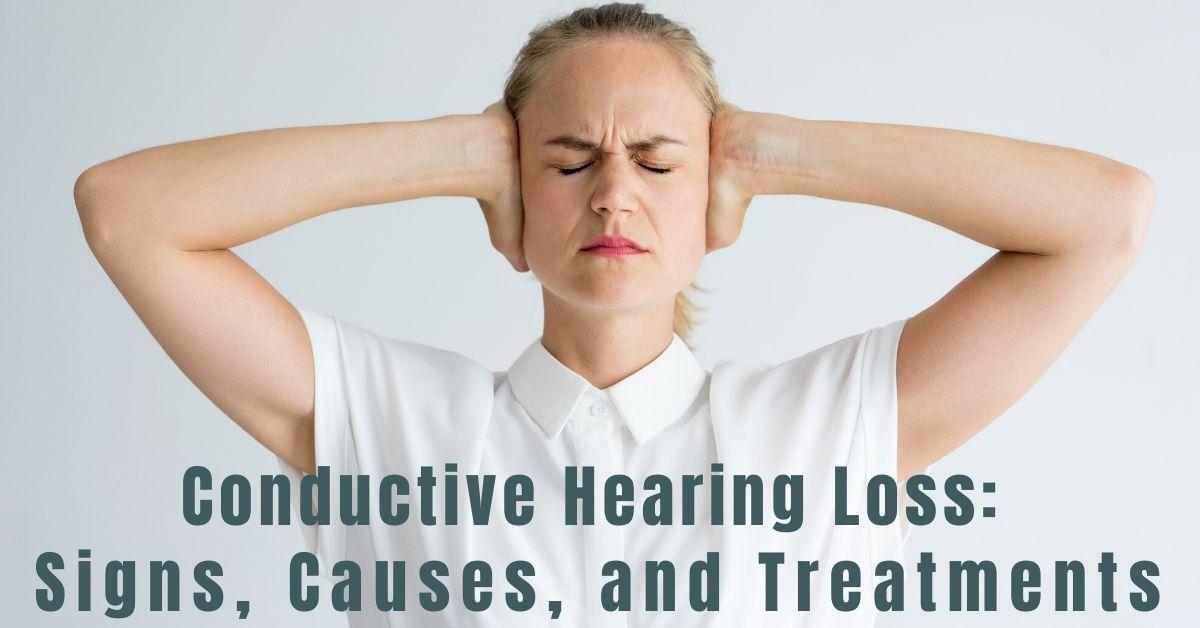Did you know that there are three main kinds of hearing loss? Sensorineural hearing loss affects the cells in the inner ear, conductive hearing loss affects the outer and middle ear, and mixed hearing loss is a combination of both sensorineural and conductive hearing loss. When you think about hearing loss you probably imagine sensorineural hearing loss, caused by exposure to loud noises, or as a result of aging. However, conductive hearing loss is also very common, so learn more about the signs, causes, and treatments options of conductive hearing loss.
What is Conductive Hearing Loss?
Conductive hearing loss starts in the outer or middle ear. This includes the ear canal, the ear drum, and the three ossicles, tiny bones in the middle ear. Conductive hearing loss is caused when the ear canal is obstructed, or the structures of the outer or middle ears are damaged, blocking sounds from reaching the inner ear. If the inner ear isn’t able to analyze the sound waves and send signals to the brain about sounds in the environment, you’ll experience hearing loss.
Signs of Conductive Hearing Loss
Unlike sensorineural hearing loss, which is often accompanied by a gradual change in hearing abilities, conductive hearing loss can be recognized by a sudden hearing loss. You’ll notice that suddenly all the sounds around you seem muffled, and both high and low frequency sounds will sound too quiet and fuzzy, almost as if you’re hearing sounds underwater. Other signs of conductive hearing loss include feeling like your ear is full, having pain in the ear, or struggling with balance issues.
Causes of Conductive Hearing Loss
Conductive hearing loss is caused by a blockage of the ear canal or damage to the middle ear, and this can happen in a number of ways. Some of the common causes of conductive hearing loss include:
- Impacted earwax: a build up of earwax in the ear canal that’s so dense it blocks sound waves and prevents sounds from reaching the ear drum or inner ear.
- Otitis media: A middle ear infection that leads to swelling, and a buildup of fluid in the middle ear
- Swimmer’s ear: an infection in the ear canal, often caused by water trapped in the ear. This can lead to pain, discharge, and hearing loss.
- Cholesteatoma: a harmful growth of skin in the middle ear that inhibits middle ear function.
- Otosclerosis: a bone disease that can impact the ossicles in the middle ear, which sometimes fuse together, making it impossible for sound waves to reach the inner ear.
A hole in the tympanic membrane, or ear drum, caused by an injury or infection.
Treating Conductive Hearing Loss
If you’ve noticed any of the signs of conductive hearing loss, visit your family doctor, an ENT, or your hearing health specialist to determine the cause and severity of your hearing loss. There are several treatment options available to manage conductive hearing loss, including both medical and surgical options. Depending on the cause of your hearing loss, simply removing a build up of earwax, or consulting with your doctor to treat an infection can help you hear clearly. If your hearing loss is caused by structural damage, your best option may be to wear a surgical implant that bypasses the parts of the ear that aren’t able to transmit sound waves.
Conductive Hearing Loss and Hearing Aids
Another great treatment option is to wear hearing aids and get back to clear hearing. Some forms of conductive hearing loss are best treated with a hearing aid that will amplify the sounds around you, help you focus on what you want to hear, and make it easy to localize sounds in your environment. Even after medical intervention, you may still experience some hearing loss, and a hearing aid will help you enjoy your life without worrying about all the things you can’t hear.
Modern hearing aids are sleek devices that range from behind the ear devices to tiny in the canal hearing aids, and you’ll easily find the device that perfectly matches both your lifestyle and your hearing needs. With advanced features like Bluetooth connectivity, feedback reduction, and speech enhancement, hearing aids will help you overcome your hearing loss, and enjoy a happy and fulfilled life.

